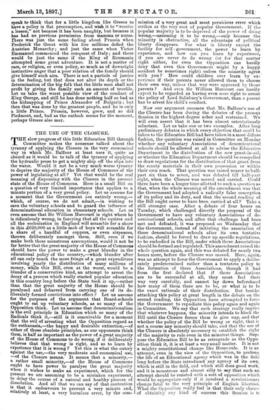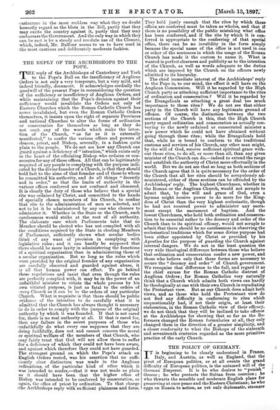THE USE OF THE CLOSURE. T HE slow progress of this
little Education Bill through Committee makes the nonsense talked about the tyranny of applying the Closure in the very economical way in which Mr. Balfour at least uses it, quite as absurd as it would be to talk of the tyranny of applying the hydraulic press to get a mighty ship off the slips into the water. Would it not be a very much worse tyranny to deprive the majority of the House of Commons of the power of legislating at all ? Yet that would be the real meaning of dispensing with the Closure in the present state of the House of Commons. Here is a small Bill on a question of very limited importance that applies to a minute portion of a very great policy. Let us assume for a moment that the Government are entirely wrong,— which, of course, we do not admit,—in wishing to save the voluntary schools and to guard the influence of denominational education in elementary schools. Let us even assume that Sir William Harcourt is right where he is ridiculously wrong, in fancying that all the squires and all the ecclesiastics in England will scramble for a share in this £620,000 as a little mob of boys will scramble for a share of a handful of coppers, or even sixpences, thrown deliberately amongst them. Still, even if we make both these monstrous assumptions, would it not be far better that the great majority of the House of Commons should have the power to make a great blunder in the educational policy of the country,—which blunder after all can only touch the mere fringe of a great expenditure involving yearly the distribution of many millions of money, while this Bill, even at the worst, would be a blunder of a conservative kind, an attempt to arrest the decay of a process which really started popular education in this country long before the State took it up,—rather than that the great majority of the House should be paralysed and debarred from carrying one of its de- liberately formed convictions into effect ? Let us assume for the purposes of the argument that Board-schools ought to eat up voluntary schools, as so many of the Opposition think. Let us assume that denominationalism is the evil principle in Education which so many of the Radicals think it,—still is it conceivable for a moment that the evil of arresting what the Opposition regard as the euthanasia,—the happy and desirable extinction,—of either of those obsolete principles, as our opponents think them, is half as important as the power of a great majority of the House of Commons to do wrong, if it deliberately believes that that wrong is right, and so to learn by experience that it is wrong ? Yet this is what the outcry against the use,—the very moderate and economical use, —of the Closure means. It means that a minority,— a rather small minority,--of the House of Commons ought to have power to paralyse the great majority when it wishes to make an experiment, which for the present we are assuming to be a mistaken experiment, to delay the course of a natural and healthy process of dissolution. And all that we can say of that contention is that it endeavours to prevent a very minute and, relatively at least, a very harmless error, by the corn- mission of a very great and most pernicious error which strikes at the very root of popular Government. If the popular majority is to be deprived of the power of doing wrong,—assuming it to be wrong,—only because the minority is obstructive, all the advantage of political liberty disappears. For what is liberty except the facility for self - government, the power to learn by experience, and how can you learn by experience, if you are never to do wrong (or for that matter right either, for even the Opposition can hardly deny that even this Government might by a happy accident be sometimes right) unless the minority agree, with you ? How could children ever learn by ex; perience if their parents never allowed them to choose their own way, unless that way were approved by those parents ? And even Sir William Harcourt can hardly expect to be regarded as having even more right to arrest the policy of Lord Salisbury's Government, than a parent' has to arrest his child's conduct.
Now our argument assumes that Mr. Balfour's use of the Closure has been during the debates of the present Session in the highest degree sober and restrained. We will even assert that it has been almost ostentatiously reluctant. Let us take one or two examples. After long preliminary debates in which every objection that could be taken to the Education Bill had been taken in a most diffuse fashion, the question was raised in Committee on Monday whether any voluntary Associations of denominational schools should be allowed at all to advise the Education Department in the distribution of the new grant-in-aid, or whether the Education Department should be compelled to draw regulations for the distribution of that grant from the scanty materials in their own possession or within their own reach. That question was raised nearer to half- past six than to seven, and was debated till half-past eight, when the Closure was moved and carried. Could there have been a longer time allotted to such a question as that, when the whole meaning of the amendment was that the Government had adopted a radically false conception of its policy and its duty, and that the second reading of the Bill ought never to have been carried at all? Take a, still stronger case. After a debate of four hours on Tuesday, which challenged directly the proposal of the Government to have any voluntary Associations of de- nominational schools, and after that challenge had been met and defeated, it was proposed on Wednesday that the Government, instead of initiating the association of these denominational schools after its own tentative fashion, should be forced to draw up specific regulations, to be embodied in the Bill, under which these Associations should be formed and regulated. This amendment raised the whole question again, and this was debated for nearly two hours more, before the Closure was moved. Here, agais., was an attempt to force the Government to apply a delibe- rately predetermined rather than a tentative policy to the formation of these Associations, though it had from the first declared that if these Associations are to be successful at all, they must feel their way very carefully, and cannot lay down beforehand how many of them there are to be, or what is to be the exact rationale of their distribution. But besides attacking this policy at great length in the debate on the second reading, the Opposition have attempted to force the Government to repudiate this policy again and again in Committee. We say that such strategy really implies that whatever happens, the minority intends to block the Bill until the Closure forces them to give way, and that whether the policy of the Bill be wrong or right, that is not a course any minority should take, and that the use ol the Closure is absolutely necessary to establish the right of the majority to rule even in the minutest things. Sup- pose the Education Bill to be as retrograde as the Oppo- sition think it, it is at least a very small matter. It is not i a mighty constitutional change like Home-rule. It is an attempt, even in the view of the Opposition, to prolong the life of an Educational agency which was in the field long before the State introduced any agency of its own, which is still in the field, and which still does good work, and it is monstrous and almost silly to say that such an attempt should be resisted with a sort of opposition which, would be appropriate only if itinvolved a revolutionary change fatal to the very principle of English liberties. What the Opposition really feel is that their only chance of obtaining any kind of success this Session is tc -caricature in the most reckless way what they no doubt honestly regard as the blots in the Bill, partly that they may excite the country against it, partly that they may -.embarrass the Government. And the only way in which they can be met is by a steady and resolute use of the Closure, which, indeed, Mr. Balfour seems to us to have used in the most cautious and deliberately moderate fashion.



































 Previous page
Previous page